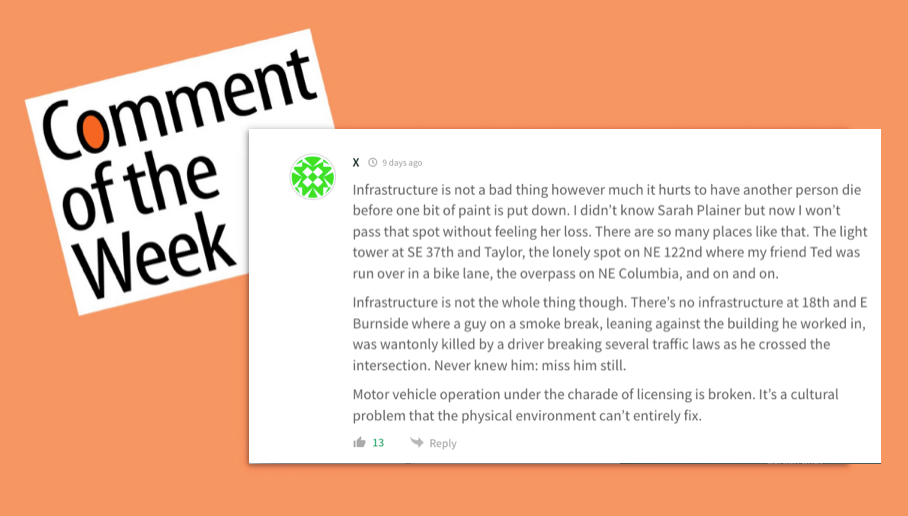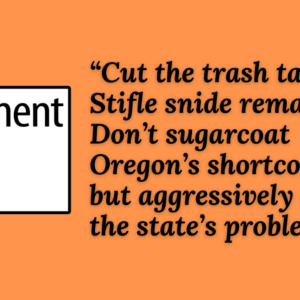Welcome to the Comment of the Week, where we highlight good comments in order to inspire more of them. You can help us choose our next one by replying with “comment of the week” to any comment you think deserves recognition. Please note: These selections are not endorsements.
Once again, there were several outstanding comments to choose from, and so many nominations, thank you! It took me a long time to pick a comment this week. I spent about 45 minutes going through the nominations, and re-reading my favorites. It was time well-spent.
I ended up going with X’s comment on the new green bike boxes at the intersection where Sarah Pliner was killed. I liked it because of its quiet tone and slow build. Read it and see if you agree with me, it sneaks up on you:
Infrastructure is not a bad thing however much it hurts to have another person die before one bit of paint is put down. I didn’t know Sarah Pliner but now I won’t pass that spot without feeling her loss. There are so many places like that. The light tower at SE 37th and Taylor, the lonely spot on NE 122nd where my friend Ted was run over in a bike lane, the overpass on NE Columbia, and on and on.
Infrastructure is not the whole thing though. There’s no infrastructure at 18th and E Burnside where a guy on a smoke break, leaning against the building he worked in, was wantonly killed by a driver breaking several traffic laws as he crossed the intersection. Never knew him: miss him still.
Motor vehicle operation under the charade of licensing is broken. It’s a cultural problem that the physical environment can’t entirely fix.
Thank you , X, for the beautiful comment. You can find X’s comment under the original post.






Thanks for reading.
BikePortland has served this community with independent community journalism since 2005. We rely on subscriptions from readers like you to survive. Your financial support is vital in keeping this valuable resource alive and well.
Please subscribe today to strengthen and expand our work.
I’ve got to say, this thread contains some of the most insightful, and well put thoughts on what feels like a continuous battle for people’s safety. Very concisely written. Thanks all for sharing.
Infrastructure can get us 90% of the way there in terms of safety. Our biggest problem here is that ODOT and PBOT refuse to install safe infrastructure, specifically because it works.
PBOT/ODOT wants to use painted bike lanes, dropping speed limits, beg barrels, ‘advisory bike lanes’ and the like because they don’t slow motorists down. It’s a feature to them, not a bug. East Burnside is designed to be an urban highway and then we put speed limit signs there as a ‘pretty please don’t speed’. Burnside was and is designed for motorists to go 55+mph and no matter what dumb little signs say, people are going to drive too fast on it until PBOT has the integrity to make it psychically hard to go fast.
Hell, some young women died on N Greeley and PBOT’s response was to make the road faster and wider.
If PBOT viewed cars as the dangerous threat to human life they are, we’d have protective walls and no parking on every single thoroghfare in the city.
I believe in building safe infrastructure and with certain reservations I’m in favor of some amount of enforcement of traffic laws. What I don’t believe is that when humans choose to drive in such a way that their vehicle can leave the road, there is any amount of concrete or any number of cops that will stop them.
We have to build better roads. We have to train law enforcement officers differently. We have to decide before starting the car that today we’re not killing each other. That decision should be the standard of care for a motor vehicle operator.
The guy’s name was Chris Copeland. He went outside to have a break. Can anyone tell me what he didn’t do that he could have done?
It hurts to say his name in this way and I am sorry for his family and friends.
Any solution that relies on motorists to make good decisions is a non-solution. Enforcement, especially human enforcement is not really a solution either. I’m not anti-enforcement, especially if its focused on the most dangerous activities, but most cops are also dangerous drivers. You can see PPB officers speeding, playing on their phones/computers while driving. Hell, most of them wont even turn their lights on in low-viz situations. They aren’t a solution.
Even if the cops cared about traffic safety, there isn’t enough of them to effectively slow down traffic. The level of saturation you’d need would quintuple the size of PPB.
Many motorists care more about their vehicles than the humans around them. Tight lanes, high curbs, and speed bumps force motorists to slow down. Asking them does nothing.
Lisa,
We aren’t so much interested in your favorite comment (no offense) but the reader’s choice of best comment. That would be more interesting and meaningful to me.
Thank you for writing, Mary. Comment of the week is not a readers choice of best comment, never has been. But I do review all of the “comment of the week” nominations, and X’s comment received one, as well as 13 thumbs up!
(Usually Jonathan weighs in too, but he’s gone this week.)
You have a good evening!
I think it’s good that BikePortland writers and editors can choose a comment of the week, because those selected comments make an example of the kind of comments that BP’s staff think are the best! We can all see the kinds of comments chosen, and I think most of us commenters will probably be influenced to write comments more like the chosen examples.
And BP’s staff are in charge of creating the “vibe” of the site, not its commenters. I think this kind of “moderation” is one of the ways in which BP is prevented from turning into a kind of social media, and prevented from turning into a continual gripe fest about homeless people.
I’m curious when safety and car-lite/free/whatever lifestyles became a left wing thing? I actually think my choice to ride a bike is intensely conservative – I am responsible for my own transportation, don’t rely on complex supply chains, don’t externalize the costs of my choices to others, and save money that I can invest in my family and future. Those sound like conservative values, but somehow a decision to take personal responsibility for one’s daily needs has apparently become a left wing thing.
I’m not trolling – I’m actually looking to understand why cars are a right wing thing and bikes a left wing thing.
Petro-masculinity plays a big role.
What about the toxic masculinity inherent in cycling?
There are so many ways to ride a bike. Often it’s perfectly peaceable, graceful, and even playful. Several women of my acquaintance ride bikes. How should I let them know about the TM thing?
Bike racing is kinda butch but even in that world you see people who are doing it for love. Racing rewards patience and cooperation just as much as aggression. Road racing may be as close as a guy can get to giving birth (but I wouldn’t really know about that).
Comment of the week!
Well, it would be nice to see a Comment of the Week come from a comment under a Comment of the Week.
Seriously, it’s a terrific question and one I will ponder. Whenever someone in a truck or SUV – cuz it’s always a truck or SUV – yells or throws something in my direction and then speeds off, I always think: Bet you could never keep up with me on my bike. Motor vehicles enabled aggression, which tends to be a right-wing trait, in my experience.
Cotw-squared. Or maybe it’s a first derivative. I think maybe we’ve done it once before. But your nomination is noted!
I’m highly influenced by some conservative principles, and basically think of myself as a temperamentally conservative. But I have an idiosyncratic understanding of conservatism, I’m a Democrat, and the common modern tropes of conservatism are not my thing (big loud trucks, the obnoxious intolerance of “anti-wokeness”, Trump, etc,) so your suggestion of cycling as an inherently conservative choice resonates with me.
From my perspective, many popular “conservative” political belief aren’t conservative at all: many issues could be coin-flipped very easily! Most glaring is the GOP’s attitude toward environmental conservation itself. Regarding transgender issues, why aren’t conservatives up in arms in favor of an individual’s right to self-determination? Regarding the individual mandate for health insurance, why are “conservatives” carrying so much water for people who want to freeload on our health care system? Can someone tell me how the hell the US right wing is in favor of Russia after it invaded a democratic, free-market economy next door?
So, here’s a theory:
Maybe what we see here is the dark side of conservatism: when self-reliance as a value curdles into a refusal to recognize the dignity of people whose lives require protections provided by the state. For all of human history, power and wealth accrue in a small number of people, who will lord it over the rest, except for the state acting to protect us; many on the right view that state action as illegitimate.
On a city street, this looks like a protected bike lane or a vulnerable road user law. “Conservative” drivers often view this as an illegitimate attempt by the state to “social engineer” us to behave differently.
An extremely simplistic reading is that the cyclist relies on the government’s white paint and legal protection, while a driver relies on the mass and the gas that they paid for themselves! But this ignores the self-reliance of a rider, who does’t need gas for their bike and can fix their bike easily at home, while also ignoring the state subsidy of gasoline, and the regulation of automobile construction and roads.
Without the state action (bike lane, VRU), the roads would be far less safe for a rider, especially given the larger and larger vehicles that populate our roads (many driven by conservatives!).
My favorite part of that comment was:
“Never knew him; miss him still.”
Wow – that’s a level of empathy I can’t seem to muster.